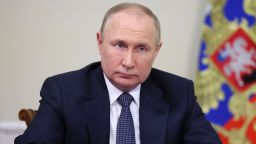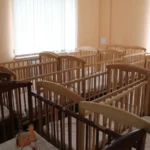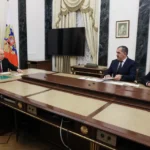ICC’s Arrest Warrant for Russian Officials
The International Criminal Court (ICC) has issued an arrest warrant for Russian President Vladimir Putin and official Maria Lvova-Belova over an alleged scheme involving the deportation of Ukrainian children to Russia.
Details of the Allegations
The ICC states that there’s credible evidence to believe Putin holds individual criminal responsibility for the said crimes. This includes direct involvement and failing to exert control over subordinates responsible for the acts.
Charges Reflecting Ongoing Issues
These charges by the ICC mirror concerns previously reported by various outlets, including CNN. These are the first official charges against Moscow officials since the onset of their unprovoked aggression towards Ukraine.
Kremlin’s Response to the ICC
The Kremlin has expressed staunch opposition to the ICC’s decision, dismissing its relevance and jurisdiction over Russia.
Zelensky’s Acknowledgment
Ukrainian President Volodymyr Zelensky applauded the ICC for its significant decision, emphasizing that Ukrainian investigations also indicate Kremlin’s involvement in forcibly deporting children to Russia.
ICC’s Chief Prosecutor’s Stance
Chief Prosecutor Karim Khan, in an exclusive CNN interview, accentuated the importance of universal human rights, emphasizing the necessity of accountability for grave crimes.
Historical Context
Khan highlighted previous instances where powerful figures, including Nazi war criminals, faced trials, underscoring the possibility of Putin facing similar justice.
Russia’s ICC Membership Status
It’s important to note that Russia isn’t an ICC member, thus making in-absentia trials impossible. For charges to progress, Russian officials would either have to be extradited or apprehended outside Russia.
War Crime Allegations Context
A senior Ukrainian official shared that Kyiv has been urging the ICC to issue arrest warrants against Russian individuals in relation to the ongoing war in Ukraine.
Russia’s Defense and Propaganda
The Russian government admits to relocating Ukrainian children and has even promoted their adoption by Russian families as part of their propaganda.
Lvova-Belova’s Dismissive Reaction
Lvova-Belova, the targeted Russian official, brushed off the ICC’s warrant, suggesting it was a recognition of her efforts for children.
Reactions from Ukrainian Officials
Andry Yermak, Zelensky’s Chief of Staff, intimated that the warrant for Putin is just the start, while Ukrainian General Prosecutor Andriy Kostin stressed that world leaders might now reconsider their interactions with Putin.
Human Rights Watch’s Take
Human Rights Watch lauded the ICC’s decision, describing it as a stark reminder to those committing or concealing abuses. They emphasized the importance of accountability, regardless of one’s rank or position.

Maria Lvova-Belova, the Russian children’s rights commissioner, is also accused of war crimes.
Moscow’s Dismissal of the ICC Warrant
Moscow swiftly denounced the ICC’s arrest warrant. Maria Zakharova, the ministry of foreign affairs’ spokesperson, emphasized Russia’s position that the court holds no legal relevance for them. This stance traces back to Russia’s 2016 withdrawal from the ICC treaty via a directive signed by Putin.
Dmitry Medvedev’s Sarcastic Take
Former Russian President Dmitry Medvedev, currently the Deputy Chair of the Security Council of Russia, trivialized the ICC’s arrest warrant for Putin on Twitter. He suggested a rather derogatory use for the “paper” accompanied by a toilet paper emoji.
Mixed Feelings in Kyiv
While the news was largely met with approval on Kyiv’s streets, there were reservations concerning the practical implications of the warrants.
A Museum Worker’s Optimism
Victoria Tkachenko, employed in a museum, saw the development as positive but remained pragmatic about the drawn-out nature of legal processes. She reiterated her optimism, emphasizing Ukraine’s battle against an aggressor.
A Student’s Realistic Viewpoint
Olexandra Zahubynoga, a student and teacher, praised the ICC for spotlighting the issue. However, she expressed skepticism about international organizations, highlighting the gap between their words and tangible actions.
A Businessman’s Skepticism about Moscow’s Reaction
Businessman Serhii Voloshenyuk opined that although the arrest warrants have significance, they’re unlikely to be treated seriously in Moscow due to its notorious history. He voiced his desire to see Putin face consequences similar to the Yugoslavian war criminals in The Hague.

Exterior view of the International Criminal Court in The Hague, Netherlands.
ICC President Emphasizes Limited Efficacy of Arrest Warrants
ICC President Judge Piotr Hofmanski, in a conversation with CNN on Friday, underscored the ICC’s arrest warrants as measures of “deterrence” rather than magical solutions. He expressed his belief in their effectiveness amid Russia’s ongoing invasion of Ukraine, characterizing them as a form of “sanction” imposed on individuals.
ICC’s Legal Obligation and Putin’s Limited Travel Options
Responding to queries about the ICC’s stance on signatory countries arresting Putin if he visits them, Hofmanski cited the ICC statute, stating that all state parties are legally obligated to fully cooperate with the court. This cooperation includes executing arrest warrants issued by the court, which, in essence, acts as a sanction by restricting the individual’s ability to leave the country. He further noted that out of the 123 states that are parties to the ICC, two-thirds would not provide safe haven for Putin.
The ICC: An Independent Entity in The Hague
Situated in The Hague, Netherlands, and established by the Rome Statute treaty presented to the United Nations, the ICC operates autonomously. While the majority of countries on the planet, numbering 123, are parties to the treaty, there are significant exceptions, such as Russia.
The ICC’s Role as a Court of Last Resort
The ICC serves as a court of “last resort” and does not aim to supplant a nation’s justice system. Comprising 18 judges with nine-year terms, the court’s jurisdiction covers four categories of crimes: genocide, crimes against humanity, crimes of aggression, and war crimes.
Ukrainian Forces Also Implicated in Violations
The report’s findings also documented a limited number of violations attributed to Ukrainian forces. These included “likely indiscriminate attacks and two incidents qualifying as war crimes, where Russian prisoners of war were shot, wounded, and tortured,” as stated by the United Nations Human Rights statement.


